人教版英语八年级上册 Unit 9 Can you come to my party? Section A Grammar Focus-3c 课件 (共35张PPT)
文档属性
| 名称 | 人教版英语八年级上册 Unit 9 Can you come to my party? Section A Grammar Focus-3c 课件 (共35张PPT) | 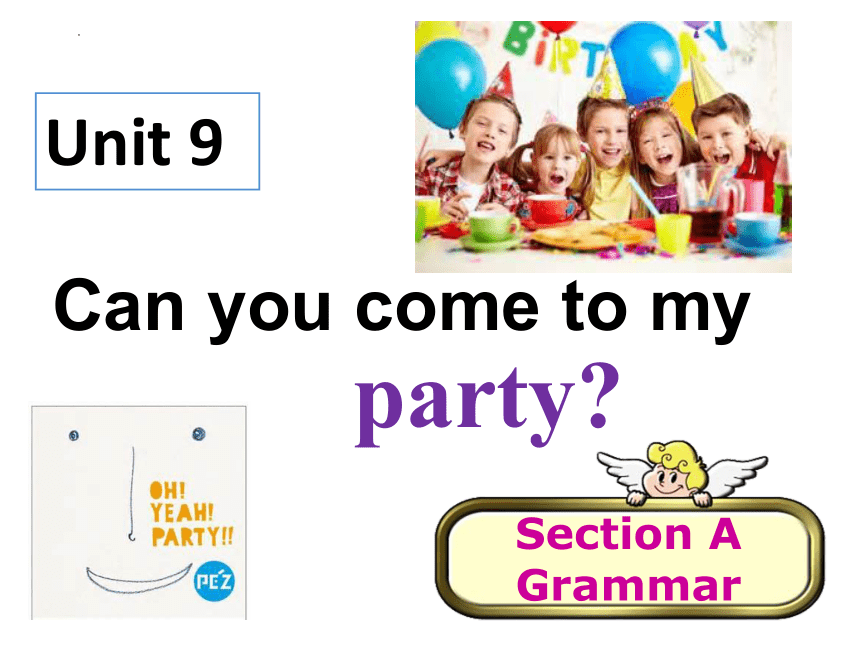 | |
| 格式 | zip | ||
| 文件大小 | 1.8MB | ||
| 资源类型 | 教案 | ||
| 版本资源 | 人教新目标(Go for it)版 | ||
| 科目 | 英语 | ||
| 更新时间 | 2022-08-07 12:06:04 | ||
图片预览

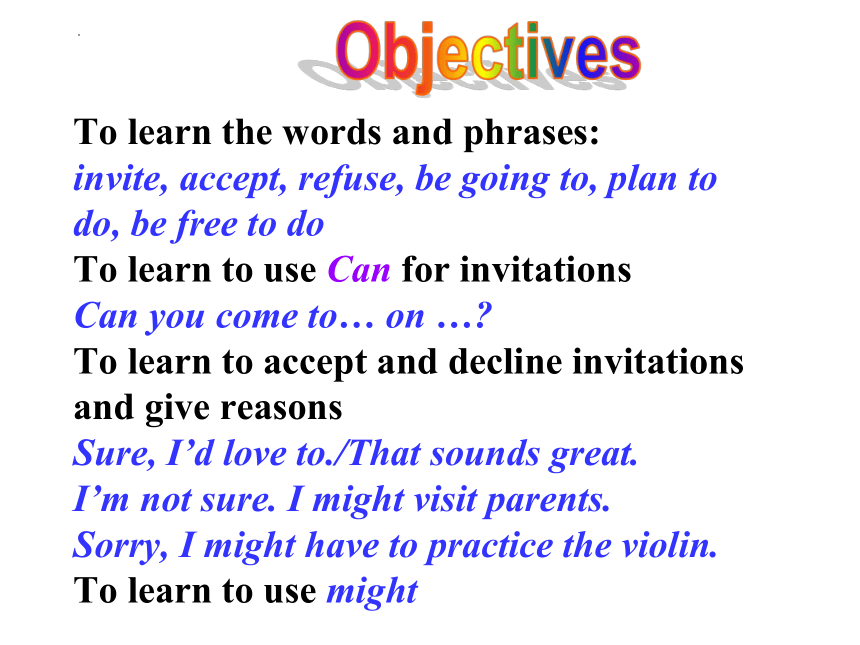
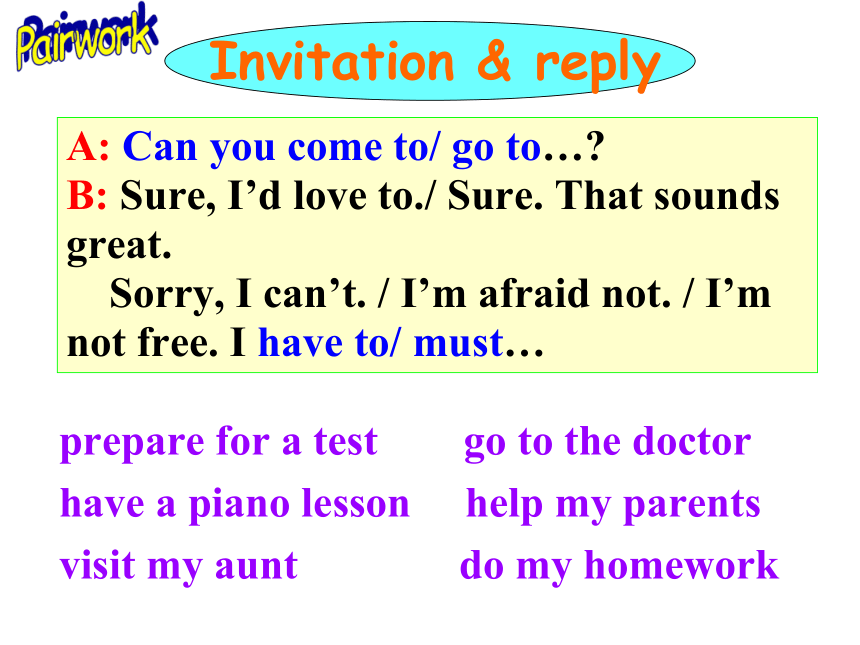
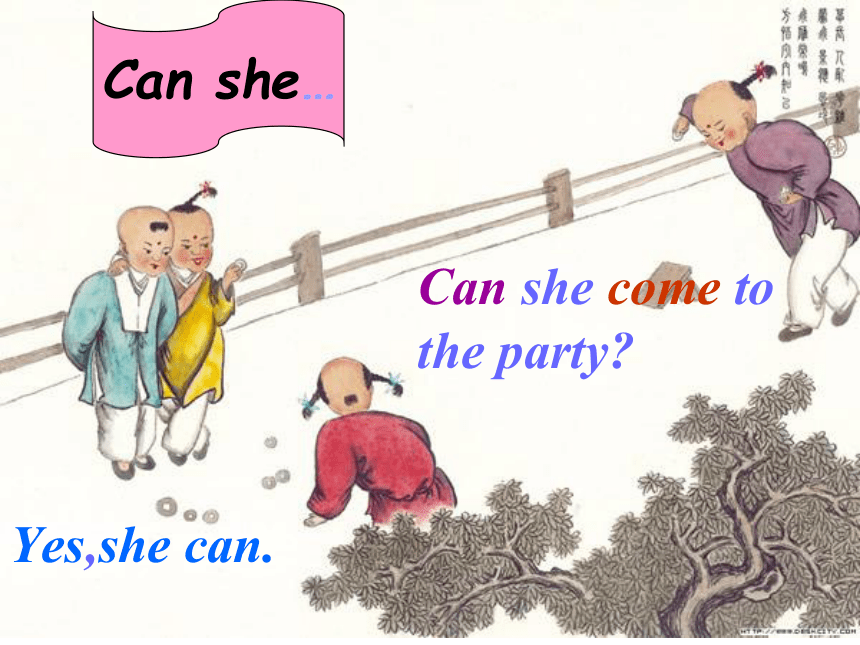
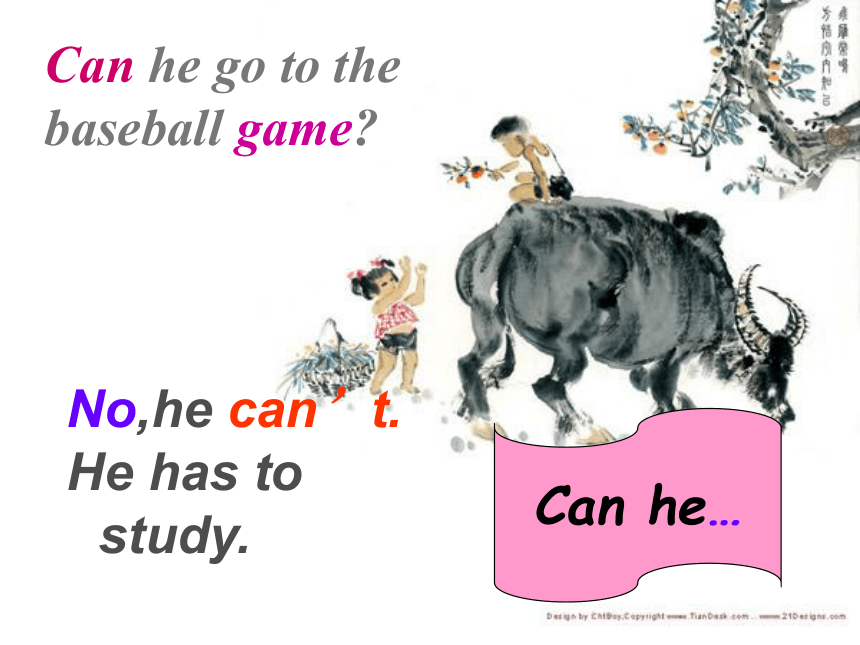
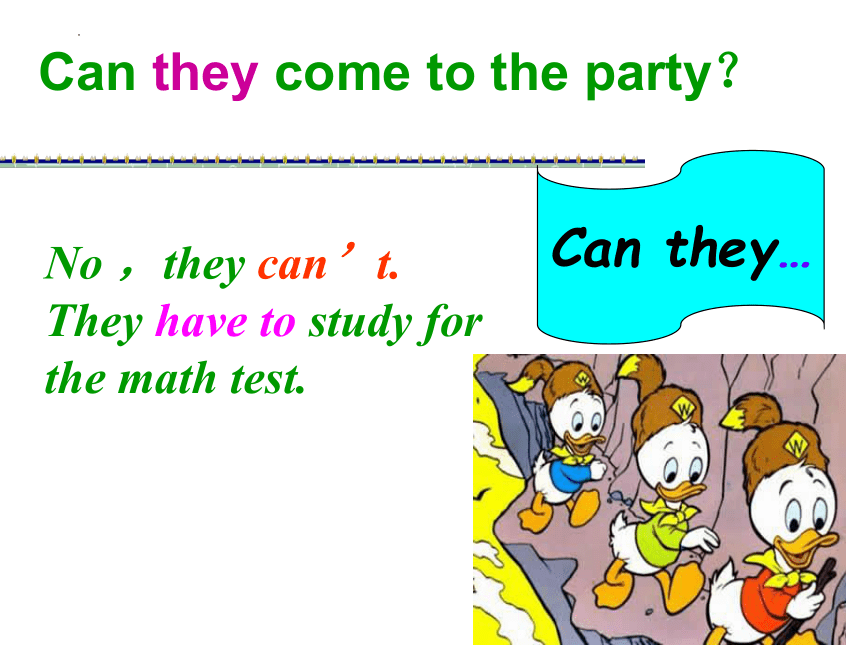
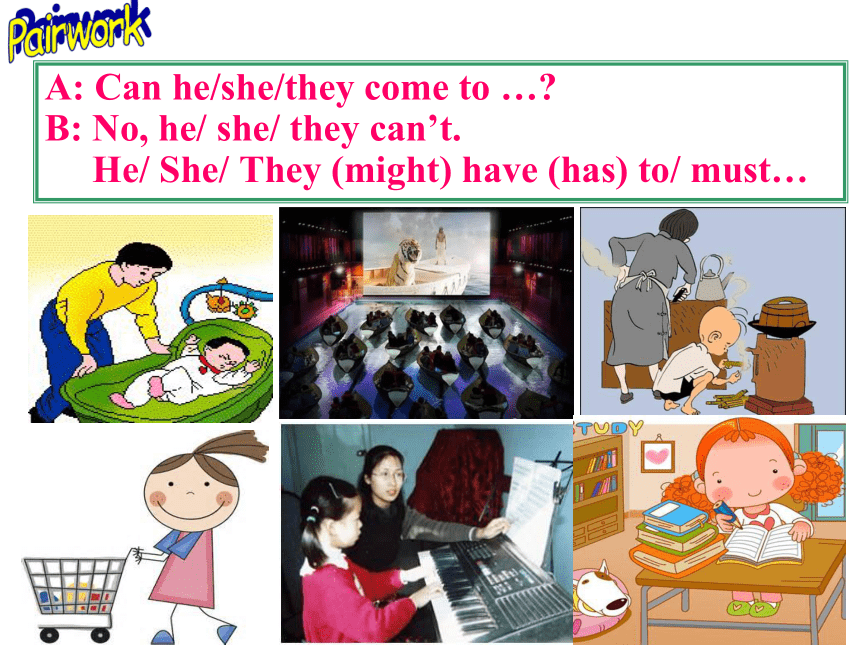
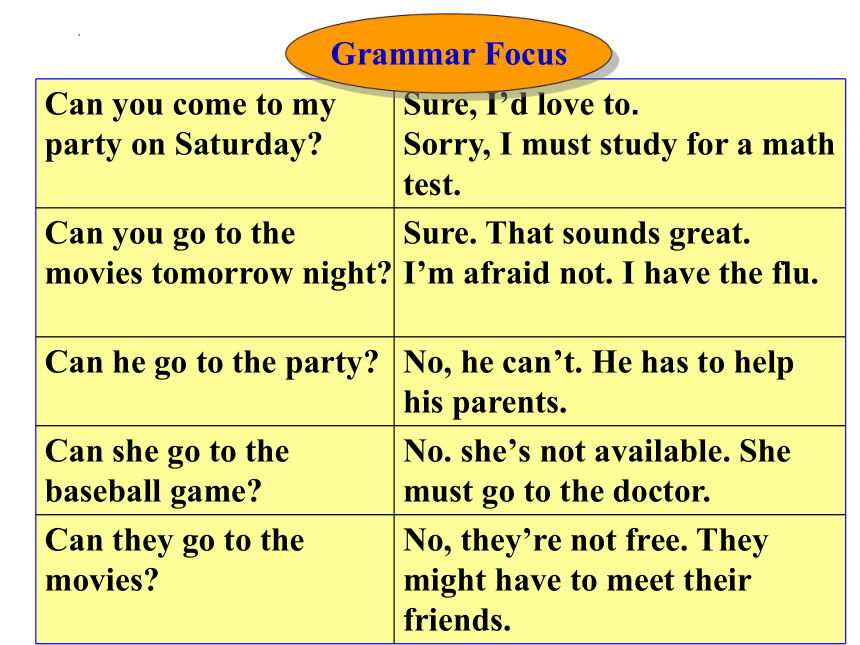
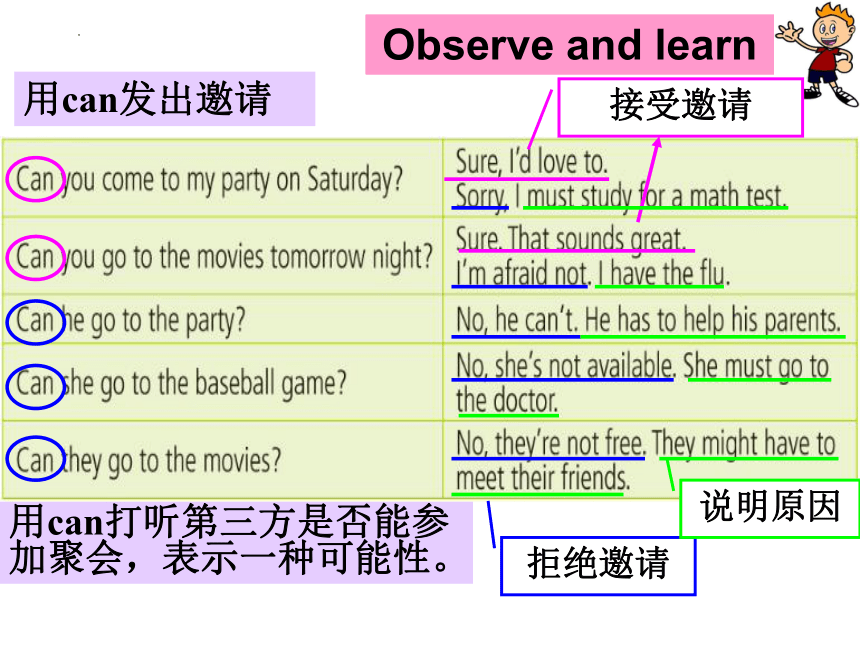
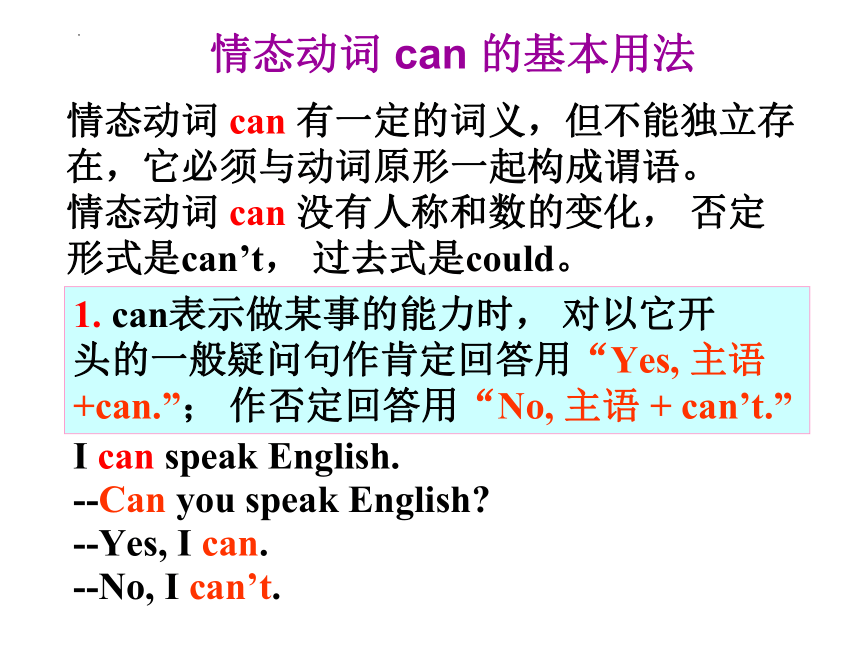
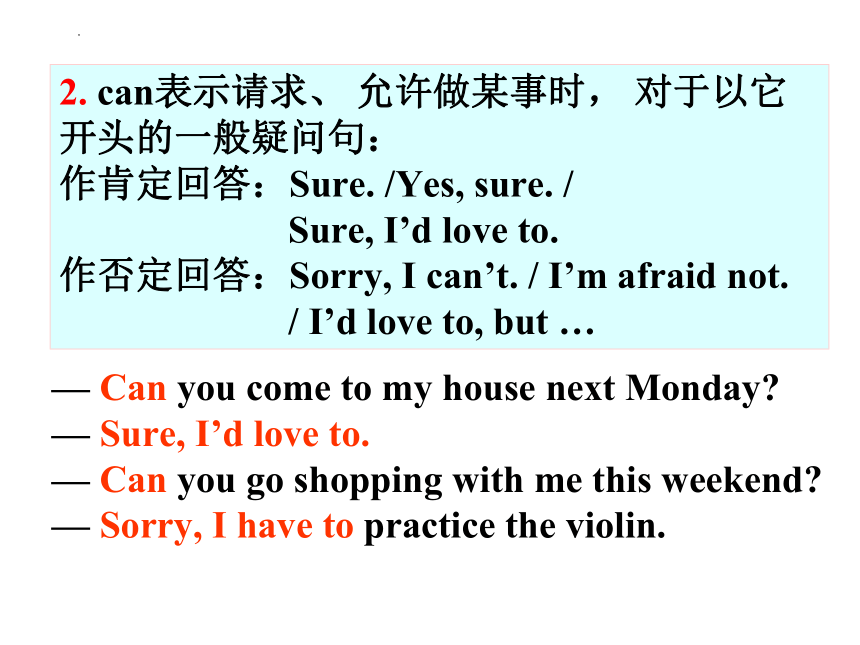

文档简介
(共35张PPT)
Can you come to my
party
Unit 9
Section A
Grammar
Objectives
To learn the words and phrases:
invite, accept, refuse, be going to, plan to do, be free to do
To learn to use Can for invitations
Can you come to… on …
To learn to accept and decline invitations and give reasons
Sure, I’d love to./That sounds great.
I’m not sure. I might visit parents.
Sorry, I might have to practice the violin.
To learn to use might
prepare for a test go to the doctor
have a piano lesson help my parents
visit my aunt do my homework
A: Can you come to/ go to…
B: Sure, I’d love to./ Sure. That sounds great.
Sorry, I can’t. / I’m afraid not. / I’m not free. I have to/ must…
Invitation & reply
Pairwork
Yes,she can.
Can she come to the party
Can she…
No,he can’t.
He has to study.
Can he go to the baseball game
Can he…
Can they come to the party?
No ,they can’t.
They have to study for the math test.
Can they…
A: Can he/she/they come to …
B: No, he/ she/ they can’t.
He/ She/ They (might) have (has) to/ must…
Pairwork
Can you come to my party on Saturday Sure, I’d love to.
Sorry, I must study for a math test.
Can you go to the movies tomorrow night Sure. That sounds great.
I’m afraid not. I have the flu.
Can he go to the party No, he can’t. He has to help his parents.
Can she go to the baseball game No. she’s not available. She must go to the doctor.
Can they go to the movies No, they’re not free. They might have to meet their friends.
Grammar Focus
Observe and learn
用can发出邀请
用can打听第三方是否能参加聚会,表示一种可能性。
接受邀请
拒绝邀请
说明原因
情态动词 can 有一定的词义,但不能独立存在,它必须与动词原形一起构成谓语。
情态动词 can 没有人称和数的变化, 否定形式是can’t, 过去式是could。
I can speak English.
--Can you speak English
--Yes, I can.
--No, I can’t.
1. can表示做某事的能力时, 对以它开
头的一般疑问句作肯定回答用“Yes, 主语 +can.”; 作否定回答用“No, 主语 + can’t.”
情态动词 can 的基本用法
2. can表示请求、 允许做某事时, 对于以它
开头的一般疑问句:
作肯定回答:Sure. /Yes, sure. /
Sure, I’d love to.
作否定回答:Sorry, I can’t. / I’m afraid not.
/ I’d love to, but …
— Can you come to my house next Monday
— Sure, I’d love to.
— Can you go shopping with me this weekend
— Sorry, I have to practice the violin.
That man can’t be Mr. Li because he is in Paris now.
那个男人不可能是李老师, 因为他现在在巴黎呢。
3. can还可以表示推测, 常用于否定句。
1. They might have to meet their friends.
2. I might watch TV on Saturday.
Observe and learn the usage of might.
might 在此表示推测和可能性。它的可能性比may小。
-What are you going to do on Sunday
-I’m not sure. I might watch TV.
-你星期天将做什么?
-我不确定。我可能看电视。
As you can see, some of the information
might be off.
正如你看到的一样,一些信息可能已经关闭了。
might可以没有把握的推测,也可表示允许或请求。
might的用法
Complete the answers with might and one of the phrases in the box.
watch TV
on the weekend
my cousin
visit my grandparents
practice the violin
3a
A: What are you going to do on
Saturday
B: I’m not sure. I might__________
____________.
2. A: What are you planning to do after
school
B: I don’t know. ________________.
3. A: When will you finish the science
homework
B:________________________
_________________.
visit my
grandparents
I might watch TV
I don’t know. I might finish it on the weekend
将要;打算
计划做某事
将要
4. A: Who are you going to the movies
with
B: ___________________________
____________________.
5. A: Are you free to come to my
place on Saturday
B:___________________________
_________________.
I’m not sure. I might go with my cousin
I’m not sure, I might have to practice the violin
be free to do sth
有空做某事
be going to & will
be going to表示即将发生的动作;
will表示将来发生的事情,不一定是最近期间之事。
She told him she was going to quit the job.
她告诉他,她即将辞职。
She will go to Australia next year.
她明年要去澳洲。
For reference
2. be going to: 表示某人打算做某事,含有主观意愿;
will: 用以叙述某件将要发生之事,是一种客观的叙述。
He is not going to be made a scapegoat.
他不会去做替罪羊。
He will not become a scapegoat.
他不会做替罪羊。
3. 在表示按计划或安排要发生的动作时,可以用be going to;will只表示单纯的将来,并无按规定或计划之意。
The railway is going to be open on October 1.
这条铁路将于十月一日通车。
This railway will be electrified when there is a need.
如果需要,这条铁路将实现电气化。
Pairwork
Practice the 5 conversations in 3a with your partner.
visit my grandparents.
I might watch TV.
I don’t know. I might finish it on the weekend.
I’m not sure. I might go with my cousin.
I’m not sure, I might have to practice the violin.
Complete the sentences below. Use the words in brackets to help you.
3b
Inviting:________________________ (can/play tennis) Accepting:_____________________
2. Inviting: ________________________
_________________ (would like to/ go to the movies)
Refusing: ____________________
Reason: ______________________
_____________ (might have to)
Can you play tennis on Saturday
Sure. That sounds great.
Would you like to go to the
movies on Friday
Sorry, I can’t.
I might have to go out with
my parents.
3. Inviting: ______________________
_______ (can/ hang out with us tonight)
Refusing: ___________________
Reason: _________________________
(must)
4. Inviting: ________________________
__________________ (would like to/
come to my birthday party)
Accepting:_____________________.
Can you hang out with us
tonight
Sorry, I’m not free.
I must study for a test.
Would you like to come to
my birthday party
Sure. I’d love to.
3c Write down everything you have to do next
week. Choose a day and time to have a party.
Then invite classmates to your party.
A: Can you come to my party
B: When is it
A: Next week, on Thursday night.
B: I’m sorry. I have to study for a math test.
星期一 Monday
星期二 Tuesday
星期三 Wednesday
星期四 Thursday
星期五 Friday
星期六 Saturday
星期日 Sunday
Do you know week
colorful weekend activities
go fishing
go shopping
go skateboarding
play basketball
go to the cinema
climb mountains
surf the Internet
go to a party
go to the concert
study for a test
go to the doctor
have a piano lesson
visit his aunt
go to a baseball game/
have baseball training
Weekend Activities
What do you usually do on weekends
What activities do you do on weekends
have to … 不得不
A: What do you have to do this weekend
B: I have to…
What weekend activities do you do
Exercise
一、选择正确的词
Thank you for (ask/ asking), but I can’t go to the movies with you.
Paul has to study (at/ for) the math test tonight.
My sister has too (much/ many) homework to do.
asking
for
much
4. Can you come to my party (at/ on) Saturday night
5. She invites me (watch/ to watch) the basketball match the day after tomorrow.
6. I like playing (piano/ the piano).
on
to watch
the piano
二、选择题
1. Can you play tennis with on Saturday
A. us B. we C. our D. ours
2. Henry his homework this afternoon.
A. have to do B. have to doing
C. has to do D. has to doing
3. Tony is playing tennis the school team.
A. on B. in C. to D. with
4. Jim play soccer with his friend this
weekend, because he is very busy.
A. can B. cans C. cann’t D. can’t
A
C
B
D
5. -
-It’s October the 14th.
A. When is today B. what’s today
C. What time is today
D. What day is today
6. He is with his father the whole day.
A. fish B. fishes
C. to fish D. fishing
B
D
三、Translate the sentences and write them down.
1. 你周日能去我家吃晚饭吗?
2. 你想参加我的生日聚会吗?是星期
五的四点半。
Would you like to come to my birthday party It’s at four thirty on Friday.
Can you come to my place to have a dinner on Sunday
3. - 你能参加我的晚会吗?
- 我不确定。我可能得帮助我妈妈。
4. 当然可以。我很愿意。
5. - 她能去看电影吗?
- 不,她不能,她正在踢足球。
- Can you come to my party
- I’m not sure. I might have to help my mom.
Sure, I’d love to.
- Can she go to the movies
- No, she can’t. She’s playing soccer.
四、从下面方框中选出最佳选项,使对话完整。其中有两项多余。
Alice: Hey, Bob.______
Bob: I’m sorry, I can’t. I have to help my parents.
Alice: _____ How about you, Ling Ling Can you come to my party
Ling Ling: _____
Alice: On Saturday afternoon.
Ling Ling: Oh, no, I can’t. ____
Alice: Too bad._______
That’s too bad.
Can you come to my party
Are you going shopping with me
Maybe another time.
I have to study for a test.
When is it
I’d love to.
B
A
F
E
D
Can you come to my
party
Unit 9
Section A
Grammar
Objectives
To learn the words and phrases:
invite, accept, refuse, be going to, plan to do, be free to do
To learn to use Can for invitations
Can you come to… on …
To learn to accept and decline invitations and give reasons
Sure, I’d love to./That sounds great.
I’m not sure. I might visit parents.
Sorry, I might have to practice the violin.
To learn to use might
prepare for a test go to the doctor
have a piano lesson help my parents
visit my aunt do my homework
A: Can you come to/ go to…
B: Sure, I’d love to./ Sure. That sounds great.
Sorry, I can’t. / I’m afraid not. / I’m not free. I have to/ must…
Invitation & reply
Pairwork
Yes,she can.
Can she come to the party
Can she…
No,he can’t.
He has to study.
Can he go to the baseball game
Can he…
Can they come to the party?
No ,they can’t.
They have to study for the math test.
Can they…
A: Can he/she/they come to …
B: No, he/ she/ they can’t.
He/ She/ They (might) have (has) to/ must…
Pairwork
Can you come to my party on Saturday Sure, I’d love to.
Sorry, I must study for a math test.
Can you go to the movies tomorrow night Sure. That sounds great.
I’m afraid not. I have the flu.
Can he go to the party No, he can’t. He has to help his parents.
Can she go to the baseball game No. she’s not available. She must go to the doctor.
Can they go to the movies No, they’re not free. They might have to meet their friends.
Grammar Focus
Observe and learn
用can发出邀请
用can打听第三方是否能参加聚会,表示一种可能性。
接受邀请
拒绝邀请
说明原因
情态动词 can 有一定的词义,但不能独立存在,它必须与动词原形一起构成谓语。
情态动词 can 没有人称和数的变化, 否定形式是can’t, 过去式是could。
I can speak English.
--Can you speak English
--Yes, I can.
--No, I can’t.
1. can表示做某事的能力时, 对以它开
头的一般疑问句作肯定回答用“Yes, 主语 +can.”; 作否定回答用“No, 主语 + can’t.”
情态动词 can 的基本用法
2. can表示请求、 允许做某事时, 对于以它
开头的一般疑问句:
作肯定回答:Sure. /Yes, sure. /
Sure, I’d love to.
作否定回答:Sorry, I can’t. / I’m afraid not.
/ I’d love to, but …
— Can you come to my house next Monday
— Sure, I’d love to.
— Can you go shopping with me this weekend
— Sorry, I have to practice the violin.
That man can’t be Mr. Li because he is in Paris now.
那个男人不可能是李老师, 因为他现在在巴黎呢。
3. can还可以表示推测, 常用于否定句。
1. They might have to meet their friends.
2. I might watch TV on Saturday.
Observe and learn the usage of might.
might 在此表示推测和可能性。它的可能性比may小。
-What are you going to do on Sunday
-I’m not sure. I might watch TV.
-你星期天将做什么?
-我不确定。我可能看电视。
As you can see, some of the information
might be off.
正如你看到的一样,一些信息可能已经关闭了。
might可以没有把握的推测,也可表示允许或请求。
might的用法
Complete the answers with might and one of the phrases in the box.
watch TV
on the weekend
my cousin
visit my grandparents
practice the violin
3a
A: What are you going to do on
Saturday
B: I’m not sure. I might__________
____________.
2. A: What are you planning to do after
school
B: I don’t know. ________________.
3. A: When will you finish the science
homework
B:________________________
_________________.
visit my
grandparents
I might watch TV
I don’t know. I might finish it on the weekend
将要;打算
计划做某事
将要
4. A: Who are you going to the movies
with
B: ___________________________
____________________.
5. A: Are you free to come to my
place on Saturday
B:___________________________
_________________.
I’m not sure. I might go with my cousin
I’m not sure, I might have to practice the violin
be free to do sth
有空做某事
be going to & will
be going to表示即将发生的动作;
will表示将来发生的事情,不一定是最近期间之事。
She told him she was going to quit the job.
她告诉他,她即将辞职。
She will go to Australia next year.
她明年要去澳洲。
For reference
2. be going to: 表示某人打算做某事,含有主观意愿;
will: 用以叙述某件将要发生之事,是一种客观的叙述。
He is not going to be made a scapegoat.
他不会去做替罪羊。
He will not become a scapegoat.
他不会做替罪羊。
3. 在表示按计划或安排要发生的动作时,可以用be going to;will只表示单纯的将来,并无按规定或计划之意。
The railway is going to be open on October 1.
这条铁路将于十月一日通车。
This railway will be electrified when there is a need.
如果需要,这条铁路将实现电气化。
Pairwork
Practice the 5 conversations in 3a with your partner.
visit my grandparents.
I might watch TV.
I don’t know. I might finish it on the weekend.
I’m not sure. I might go with my cousin.
I’m not sure, I might have to practice the violin.
Complete the sentences below. Use the words in brackets to help you.
3b
Inviting:________________________ (can/play tennis) Accepting:_____________________
2. Inviting: ________________________
_________________ (would like to/ go to the movies)
Refusing: ____________________
Reason: ______________________
_____________ (might have to)
Can you play tennis on Saturday
Sure. That sounds great.
Would you like to go to the
movies on Friday
Sorry, I can’t.
I might have to go out with
my parents.
3. Inviting: ______________________
_______ (can/ hang out with us tonight)
Refusing: ___________________
Reason: _________________________
(must)
4. Inviting: ________________________
__________________ (would like to/
come to my birthday party)
Accepting:_____________________.
Can you hang out with us
tonight
Sorry, I’m not free.
I must study for a test.
Would you like to come to
my birthday party
Sure. I’d love to.
3c Write down everything you have to do next
week. Choose a day and time to have a party.
Then invite classmates to your party.
A: Can you come to my party
B: When is it
A: Next week, on Thursday night.
B: I’m sorry. I have to study for a math test.
星期一 Monday
星期二 Tuesday
星期三 Wednesday
星期四 Thursday
星期五 Friday
星期六 Saturday
星期日 Sunday
Do you know week
colorful weekend activities
go fishing
go shopping
go skateboarding
play basketball
go to the cinema
climb mountains
surf the Internet
go to a party
go to the concert
study for a test
go to the doctor
have a piano lesson
visit his aunt
go to a baseball game/
have baseball training
Weekend Activities
What do you usually do on weekends
What activities do you do on weekends
have to … 不得不
A: What do you have to do this weekend
B: I have to…
What weekend activities do you do
Exercise
一、选择正确的词
Thank you for (ask/ asking), but I can’t go to the movies with you.
Paul has to study (at/ for) the math test tonight.
My sister has too (much/ many) homework to do.
asking
for
much
4. Can you come to my party (at/ on) Saturday night
5. She invites me (watch/ to watch) the basketball match the day after tomorrow.
6. I like playing (piano/ the piano).
on
to watch
the piano
二、选择题
1. Can you play tennis with on Saturday
A. us B. we C. our D. ours
2. Henry his homework this afternoon.
A. have to do B. have to doing
C. has to do D. has to doing
3. Tony is playing tennis the school team.
A. on B. in C. to D. with
4. Jim play soccer with his friend this
weekend, because he is very busy.
A. can B. cans C. cann’t D. can’t
A
C
B
D
5. -
-It’s October the 14th.
A. When is today B. what’s today
C. What time is today
D. What day is today
6. He is with his father the whole day.
A. fish B. fishes
C. to fish D. fishing
B
D
三、Translate the sentences and write them down.
1. 你周日能去我家吃晚饭吗?
2. 你想参加我的生日聚会吗?是星期
五的四点半。
Would you like to come to my birthday party It’s at four thirty on Friday.
Can you come to my place to have a dinner on Sunday
3. - 你能参加我的晚会吗?
- 我不确定。我可能得帮助我妈妈。
4. 当然可以。我很愿意。
5. - 她能去看电影吗?
- 不,她不能,她正在踢足球。
- Can you come to my party
- I’m not sure. I might have to help my mom.
Sure, I’d love to.
- Can she go to the movies
- No, she can’t. She’s playing soccer.
四、从下面方框中选出最佳选项,使对话完整。其中有两项多余。
Alice: Hey, Bob.______
Bob: I’m sorry, I can’t. I have to help my parents.
Alice: _____ How about you, Ling Ling Can you come to my party
Ling Ling: _____
Alice: On Saturday afternoon.
Ling Ling: Oh, no, I can’t. ____
Alice: Too bad._______
That’s too bad.
Can you come to my party
Are you going shopping with me
Maybe another time.
I have to study for a test.
When is it
I’d love to.
B
A
F
E
D
同课章节目录
- Unit 1 Where did you go on vacation?
- Section A
- Section B
- Unit 2 How often do you exercise?
- Section A
- Section B
- Unit 3 I'm more outgoing than my sister.
- Section A
- Section B
- Unit 4 What's the best movie theater?
- Section A
- Section B
- Unit 5 Do you want to watch a game show?
- Section A
- Section B
- Unit 6 I'm going to study computer science.
- Section A
- Section B
- Unit 7 Will people have robots?
- Section A
- Section B
- Unit 8 How do you make a banana milk shake?
- Section A
- Section B
- Unit 9 Can you come to my party?
- Section A
- Section B
- Unit 10 If you go to the party, you'll have a grea
- Section A
- Section B
